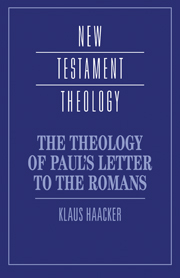Book contents
- Frontmatter
- Contents
- List of abbreviations
- 1 Introduction
- 2 Theology in a nutshell: The opening of the letter as a foretaste of what follows
- 3 Theology in process: An outline of the argument of the letter-body
- 4 Major concerns
- 5 Sorting the sources
- 6 To the Romans a Roman? The rhetoric of Romans as a model for preaching the Gospel in Rome
- 7 Romans in its canonical context
- 8 The impact of Romans and interactions with Romans in Church history
- 9 The relevance of Romans reconsidered
- Further reading
- Index of authors
- References
- Index of subjects
4 - Major concerns
Published online by Cambridge University Press: 05 June 2012
- Frontmatter
- Contents
- List of abbreviations
- 1 Introduction
- 2 Theology in a nutshell: The opening of the letter as a foretaste of what follows
- 3 Theology in process: An outline of the argument of the letter-body
- 4 Major concerns
- 5 Sorting the sources
- 6 To the Romans a Roman? The rhetoric of Romans as a model for preaching the Gospel in Rome
- 7 Romans in its canonical context
- 8 The impact of Romans and interactions with Romans in Church history
- 9 The relevance of Romans reconsidered
- Further reading
- Index of authors
- References
- Index of subjects
Summary
If Romans is a real letter and not a theological treatise in the literary form of an epistle, then we should not look for an overall ‘theme’ that is developed step by step according to logical rules. Instead, we must expect an interaction between the presuppositions (purposes, hopes, and fears) on Paul's side and those of the recipients (as far as Paul had been informed or thought he was). Our outline in the previous chapter has shown that he addresses a wide range of topics which were interconnected but which cannot be reduced to one leading idea – apart from the fact that everything in this letter is more or less related to the Gospel, which Paul mentions in prominent places as his concern. The coherence of the letter consists in the process of unfolding basic aspects and practical consequences of this Gospel. That is why all attempts to focus the interpretation of Romans under a single keyword will overestimate one aspect or portion of the letter and downgrade others. That is true of the title of Adolf Schlatter's commentary of 1935 (Gottes Gerechtigkeit – ‘God's Righteousness’) as well as of J. P. Heil's monograph Romans – Paul's Letter of Hope. On the other hand, it is quite legitimate to observe recurring concerns which deserve a special treatment. The following paragraphs will discuss several such topics which are characteristic of Paul's thought as developed in this letter.
- Type
- Chapter
- Information
- The Theology of Paul's Letter to the Romans , pp. 44 - 96Publisher: Cambridge University PressPrint publication year: 2003



